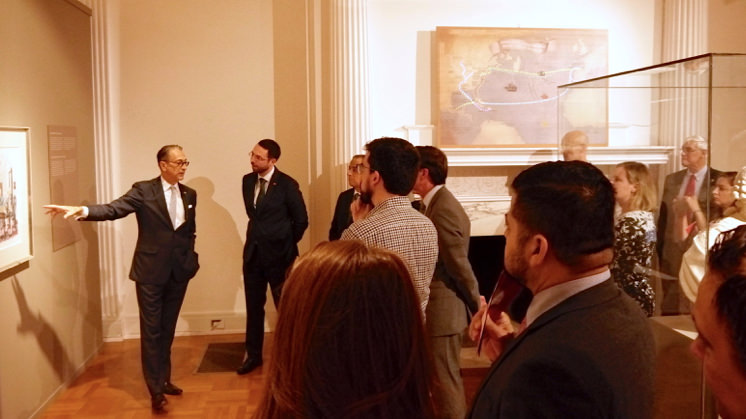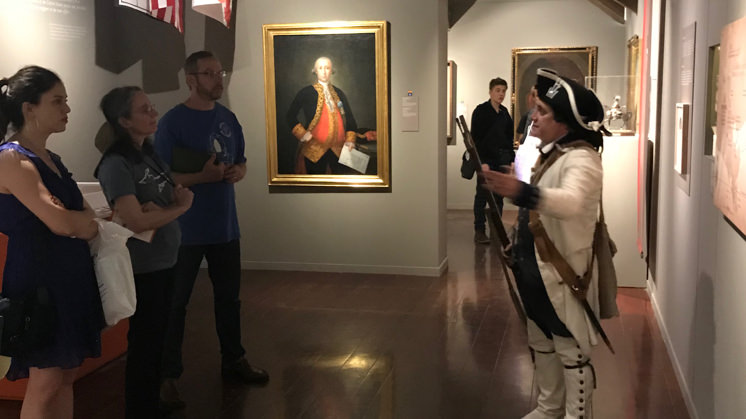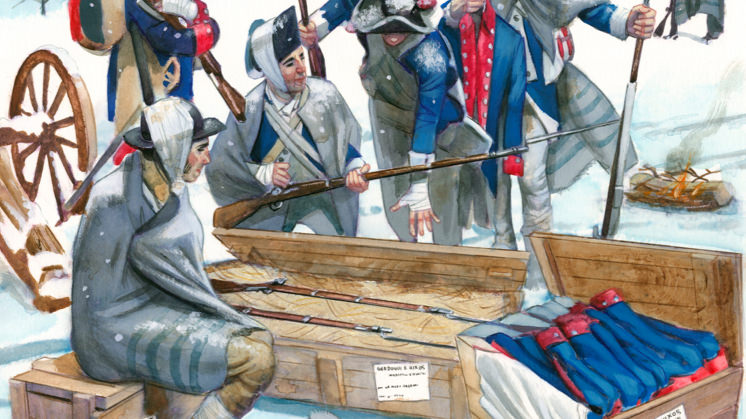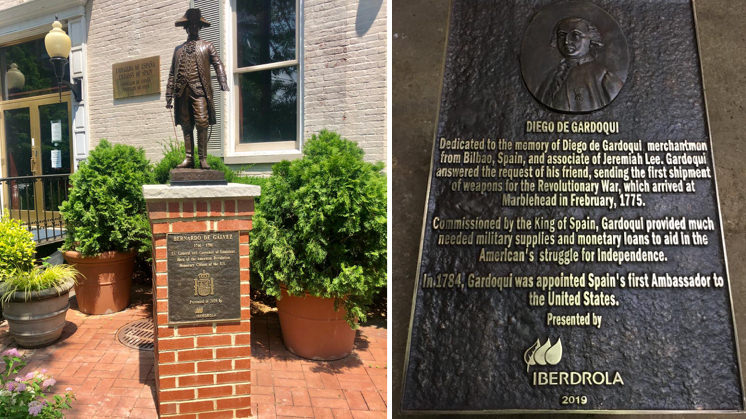Interview with José Manuel Guerrero Acosta (Unveiling Memories')
'Unveiling Memories' seeks to be a reference for knowledge and dissemination on both sides of the Atlantic
April 2017. Reading time: 3 minutes
Spain and the Hispanic world played a decisive role in the independence of the United States of America, but it is a very little known fact, and historically this contribution has scarcely been acknowledged. This is why Iberdrola has been supporting Unveiling Memories, a project led by the expert historian on the subject, José Manuel Guerrero Acosta. We are chatting with him about the importance of rescuing this story, shared between Hispanics and Americans.



José Manuel Guerrero Acosta is an academic from the Academy of Military Science and Art. He has a Higher Diploma in Contemporary History from the UNED distance learning University and a Diploma in Direction and Management of Military Museums from the Defence Ministry. He was head of the Museography Project for the new Army Museum in Toledo (2004-2006) and a member of the Institute of Military History and Culture. He is the author of over 40 articles and a dozen books. He has been historical advisor on various films and has curated a number of exhibitions in Spain and the United States.
He has been working with Iberdrola since 2015 as the curator of various exhibitions focusing on the contribution of Spain and the Hispanic world to US independence: Bernardo de Gálvez and Spain's presence in Mexico and the US (2015), Memory Regained (2017) and Recovered Memories. Spain and the Support for the American Revolution. He now runs the project Unveiling Memories, a book and website which the company hopes, ultimately, will lead to history museums in the United States finding a place for these events.
The contribution of Spain and the Hispanic world to US independence is a little-known fact, on both sides of the Atlantic. What might be the reason for this oversight?
There are a number of explanations. One is that a large part of the financial and material aid was in secret, or took place through diverse channels and intermediaries, making it impossible to quantify precisely. Another is that Spain became an adversary in the territorial expansion of the new nation. And a further one is that Spain did not make a great effort to raise its head during the 19th Century, due to its own domestic problems. Moreover, the contribution of the Hispanic world was not valued by Anglo-Saxon historians.
Why is it important to defend the role of Spain in this historic event?
I believe that millions of Hispanic people living today in the US are entitled to recognition of the fact that the Hispanic world and its forebears, which made up part of the Spanish crown territories in America, were present in a significant way at the birth of their country.
In what way did the Spanish crown help the inhabitants of the Thirteen English Colonies to obtain their independence?
The first foreign rifles that they obtained to fight against the British troops arrived in Massachusetts in 1775 from Bilbao. Thereafter, they continued to receive weapons, gunpowder, sundry supplies, uniforms and money throughout the entire war. Apart from this, Spain and France fought against England on sea and land in Europe and the Atlantic. Specifically, Spain sent the biggest expedition ever undertaken, with over 12,000 soldiers and more than 80 ships to fight in Florida, Louisiana and the Caribbean.
In your opinion, would the rebel victory have been possible without this help?
The Founding Fathers themselves declared that triumph would never have been possible without foreign help. Alexander Hamilton, for example, said: "If we are [to be] saved, France and Spain must save us."
Does any evidence remain in the US of this participation from Spain and the Hispanic world?
Naturally, some traces remain, such as abundant documents in the Congress Library, and other more recent ones, like sculptures and commemorative sites. But in general they are not very visible or well-known to the general public. We are working to make this presence greater in museums and historical sites in the US, and more permanent, by installing plaques, sculptures and content regarding the aid that was given.

In 2014, the US congress granted honorary citizenship for the first time to a Spaniard: the North American independence hero Bernardo de Gálvez. Who was Gálvez? What feats made him worthy of this recognition?
Gálvez was a charismatic leader, a very useful man, both for peace and for war. We were lucky to have him in the right place at the right time, as governor of Spanish Louisiana in 1776, and he insisted on complying with the orders of the king in driving the British out of the Gulf of Mexico. He helped with rebel supplies from New Orleans and he defeated the British after three long years of campaigns, alleviating the situation for Washington's army in the north.
Despite the prestige of such a nomination, achieved by only seven people in the world, Bernardo de Gálvez remains relatively unknown, even in Spain. How can we restore his standing, not just internationally, but also in his own native country?
Many private individuals and public institutions have spent years working for him to be better known, through books, monuments, social networks and exhibitions, such as Iberdrola's Recovered Memories project which began in 2015 with an exhibition opened by His Majesty King Felipe.
"Without the support of companies like Iberdrola and its social and cultural commitment it would be very difficult to achieve such ambitious objectives"
What is the purpose of the book Unveiling Memories? What can we find in it?
We have attempted to summarise clearly and concisely all that Spain and the Hispanic people did to help towards US independence. It is complemented by a website External link, opens in new window. where the various related projects and activities will be uploaded. The final aim is for it to be a reference for knowledge and dissemination of these events for the public on both sides of the Atlantic. Together with the highlighted facts, there are also biographies of its leading characters and the places where traces may be found in Spain of this story, which is common to Hispanics and to the United States.
External link, opens in new window. where the various related projects and activities will be uploaded. The final aim is for it to be a reference for knowledge and dissemination of these events for the public on both sides of the Atlantic. Together with the highlighted facts, there are also biographies of its leading characters and the places where traces may be found in Spain of this story, which is common to Hispanics and to the United States.
You have been collaborating with Iberdrola since 2015 on various exhibitions and other activities about the role of Spain and the Hispanic people in US independence. In what way do you think these two initiatives have helped to recover this shared memory between the Hispanic world and the United States? What has been achieved?
Although we have only been working on this project for five years, it can be seen that in Spain and the US alike there has been a big increase in interest and in the presence of everything to do with Spain's role in the country's independence in many cultural spheres and on social media. Prior to 2015, it was barely spoken about except in very limited circles. I genuinely believe that the effort from many people and institutions is coming to fruition, despite the difficulty involved in unveiling memories of a story so long-forgotten.
How do you value the support from Iberdrola group in the promotion of history in particular, and culture in general?
Without the support of companies like Iberdrola and its social and cultural commitment it would be very difficult to achieve such ambitious objectives, especially in the short term. This support is fundamental for ensuring that the image of Spain and the entire Hispanic world is correctly represented in terms of the importance it had in the birth of the United States. At the same time these activities are beneficial to the institutional image of Spanish companies abroad.




